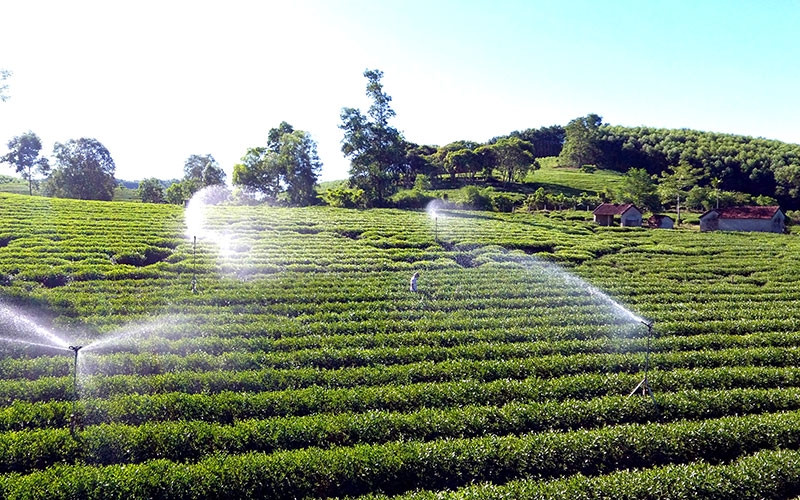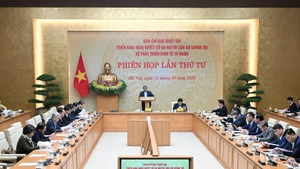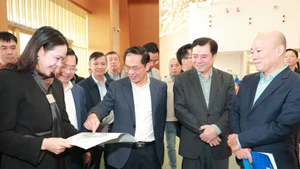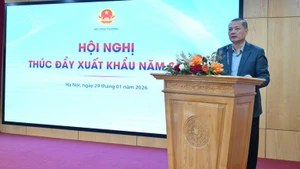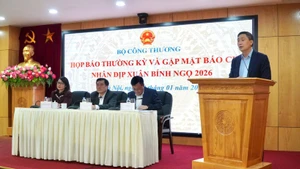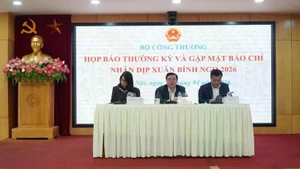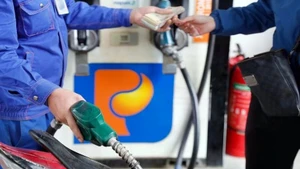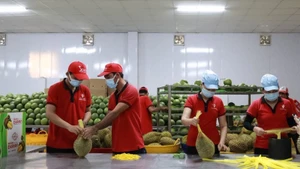However, it still faces many “bottlenecks” that need to be removed to help the trend develop even more strongly.
More and more agricultural enterprises and farmers are applying digital transformation and garnered success, creating high-quality, low-cost products with clear origin. The application of advanced technology has changed the agricultural sector. For example, the use of the internet of things (IoT) and artificial intelligence (AI) have been simplifying and streamlining the collection, inspection and distribution of agricultural resources through sensors and big data management systems.
Management of farms via smartphones
Bui Ngoc Cung in Don Duong district in the Central Highland province of Lam Dong, who has devoted himself to agriculture for 30 years, has applied IoT technology in his 2ha farm. Sensor systems and signal boxes are hung across his tomato and baby melon farms; therefore, only a few workers labour in his gardens.
Also in Lam Dong, the Langbiang Farm Limited Company is considered a pioneer in digital transformation. Tran Huy Duong, the owner of the nearly 30-ha farm, said that farmers just sit in the office, read meteorological monitoring data, control irrigation water, fertiliser, nutrition, and humidity.
17 years ago, Lam Dong province identified hi-tech agriculture as a breakthrough area for its socio-economic development. As of now, the locality has over 60,000 hectares of agricultural land using high technology, with an average production value of more than VND400 million per hectare per year. Many models earn revenue of billions of Vietnamese dongs per hectare per year. According to Vice President of Lam Dong Provincial People’s Committee Pham S, 26 businesses in the province use IoT, big data, Blockchain, and cameras to monitor the growth of trees, environmental sensor devices, greenhouses with automatic adjustment systems, incubation technology in laboratory (also known as in vitro), LED light system, and GIS technology to manage pests and e-traceability. Many farms have revenues of VND5-8 billion per hectare per year. Notably, a high-class flower farm can earn revenue of VND24 billion per hectare per year.
According to the Department of Science, Technology and Environment under the Ministry of Agriculture and Rural Development, in recent years, the agricultural sector has paid more and more attention to digital transformation solutions. In farming, IoT and Big data technologies allow the analysis of data related to the environment, the types of and growth stages of plants. In animal husbandary, IoT, Blockchain and biotechnology have been applied widely in large-scale livestock farms. The dairy industry uses digital technology most, such as the prominent models of TH TrueMilk and Vinamilk. In forestry, DND coding technology has been used for the management of forest varieties and products, while GIS technology and remotely sensing images for building software in the early detection and warning of forest fires from satellite images. AI technology has also been used in shrimp farming.
Directly connecting sellers and buyers
Amid the complicated development of the COVID-19 pandemic, many localities have proactively enhanced trade promotion through e-commerce trading floors to reduce the burden on farmers. The consumption of lychee in Bac Giang and Hai Duong and longans in Son La and Hung Yen as well as mangos, dragon fruits and durians in southern provinces are good examples of this.
A Working Group directing the production, supply and consumption of agricultural products in southern provinces and cities in the context of COVID-19 epidemic (also known as Working Group 970) under the Ministry of Agriculture and Rural Development has boosted the application of websites and the Zalo app in supply-demand connection. Up to now thousands of enterprises and consumers are regularly using these services. As of August 20, 1,218 focal points providing agricultural products and food have registered with the Working Group.
Director of Ha Tinh province’s Agricultural Extension Centre, Nguyen Van Tri, said the centre has coordinated with numerous agencies and localities to digitise the traceability of grapefruits across over 1,000 hectares in Huong Khe district ,bringing the products to e-commerce platform through the portal buoiphuctrach.gov.vn.
Not missing the “train” of digital transformation
The Ministry of Agriculture and Rural Development recently established a Steering Committee for Digital Transformation in Agriculture. It is expected that the steering committee will approve and issue a plan for digital transformation in agriculture during the 2021-2025 period, with a vision until 2030.
The ministry has identified science-technology and the reorganisation of agricultural production as two important pillars in agricultural restructuring. Both issues are closely related to digital transformation.
However, the application of digital transformation in agriculture still faces numerous difficulties due to the limited investment in scientific research and development in the agricultural sector as well as the lack of high-quality human resources for the production and processing of agricultural products.
The removal of the above difficulties will help open up and strongly spread the “flow” of digital transformation in the agricultural sector. In addition, the implementation of digital transformation should focus on building a big data system of the sector; supporting the sharing of agricultural equipment through digital platforms; applying digital technology to automate production and business processes; and accelerating the development of e-commerce and management. Thus, the agricultural sector will not miss the “train” of digital transformation during this, the fourth industrial revolution.
| The Ministry of Agriculture and Rural Development has set the target that 80% of agricultural databases will be built and updated on the Big data platform with contributions from organisations, individuals and community during the 2021-2025 period. In particular, a database on crops, livestock and aquatic products will be completed. A digital agricultural ecosystem will be enhanced to encourage people and businesses to participate in digital transformation. Meanwhile, a blockchain application platform will be developed to provide information related to the environment, weather and the quality of land to help farmers improve crop productivity and quality and support the sharing of agricultural equipment through digital means. |
